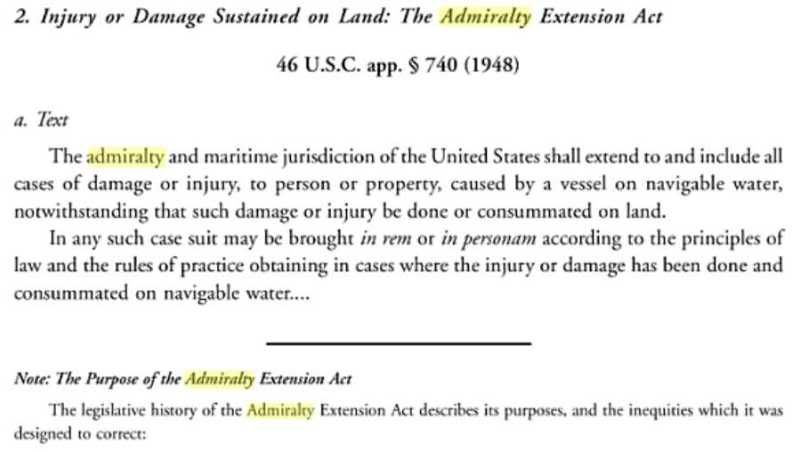Common Law and UCC 1-308
Article III, section 2 of the organic Constitution defines the kinds of judicial power the courts have:
1.common law
2.equity
3.admiralty
4.maritime
At the common law - a crime exists only when there is a victim with actual damages like a broken arm.
In equity - otherwise known as civil law a private contract is or agreement is involved. For an action to be brought there must be a breach of contract and damages.
Maritime - or commercial contract law originates in the rules of trade upon the high seas between international merchants and is enforced by military organizations.
Admiralty - is armed enforcement of the laws of commerce(the law merchant)
Where did you see this?
I looked up Article III, section 2 of the organic Constitution, Googled it and I got this:
Article III - The Judicial Branch Note
Section 2 - Trial by Jury, Original Jurisdiction, Jury Trials
(The judicial Power shall extend to all Cases, in Law and Equity, arising under this Constitution, the Laws of the United States, and Treaties made, or which shall be made, under their Authority; to all Cases affecting Ambassadors, other public Ministers and Consuls; to all Cases of admiralty and maritime Jurisdiction; to Controversies to which the United States shall be a Party; to Controversies between two or more States; between a State and Citizens of another State; between Citizens of different States; between Citizens of the same State claiming Lands under Grants of different States, and between a State, or the Citizens thereof, and foreign States, Citizens or Subjects.) (This section in parentheses is modified by the 11th Amendment.)
In all Cases affecting Ambassadors, other public Ministers and Consuls, and those in which a State shall be Party, the supreme Court shall have original Jurisdiction. In all the other Cases before mentioned, the supreme Court shall have appellate Jurisdiction, both as to Law and Fact, with such Exceptions, and under such Regulations as the Congress shall make.
The Trial of all Crimes, except in Cases of Impeachment, shall be by Jury; and such Trial shall be held in the State where the said Crimes shall have been committed; but when not committed within any State, the Trial shall be at such Place or Places as the Congress may by Law have directed.
Again, where did you find the above?
Article III, Section 2
Soma
Article III, section 2 of the organic Constitution defines the kinds of judicial power the courts have:
1.common law
2.equity
3.admiralty
4.maritime
At the common law - a crime exists only when there is a victim with actual damages like a broken arm.
In equity - otherwise known as civil law a private contract is or agreement is involved. For an action to be brought there must be a breach of contract and damages.
Maritime - or commercial contract law originates in the rules of trade upon the high seas between international merchants and is enforced by military organizations.
Admiralty - is armed enforcement of the laws of commerce(the law merchant)
Where did you see this?
I looked up Article III, section 2 of the organic Constitution, Googled it and I got this:
Article III - The Judicial Branch Note
Section 2 - Trial by Jury, Original Jurisdiction, Jury Trials
(The judicial Power shall extend to all Cases, in Law and Equity, arising under this Constitution, the Laws of the United States, and Treaties made, or which shall be made, under their Authority; to all Cases affecting Ambassadors, other public Ministers and Consuls; to all Cases of admiralty and maritime Jurisdiction; to Controversies to which the United States shall be a Party; to Controversies between two or more States; between a State and Citizens of another State; between Citizens of different States; between Citizens of the same State claiming Lands under Grants of different States, and between a State, or the Citizens thereof, and foreign States, Citizens or Subjects.) (This section in parentheses is modified by the 11th Amendment.)
In all Cases affecting Ambassadors, other public Ministers and Consuls, and those in which a State shall be Party, the supreme Court shall have original Jurisdiction. In all the other Cases before mentioned, the supreme Court shall have appellate Jurisdiction, both as to Law and Fact, with such Exceptions, and under such Regulations as the Congress shall make.
The Trial of all Crimes, except in Cases of Impeachment, shall be by Jury; and such Trial shall be held in the State where the said Crimes shall have been committed; but when not committed within any State, the Trial shall be at such Place or Places as the Congress may by Law have directed.
Again, where did you find the above?
Article III, Section 2
Soma



Comment